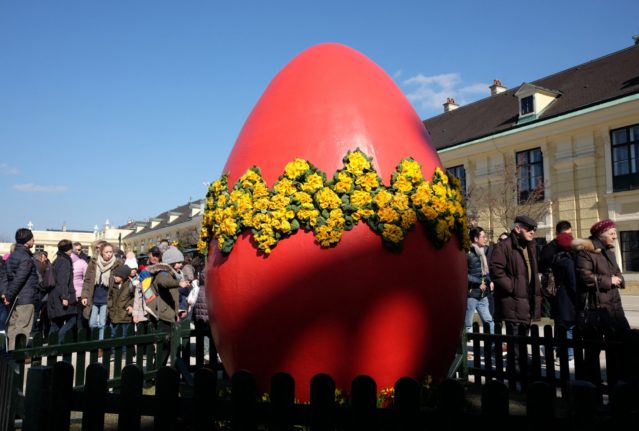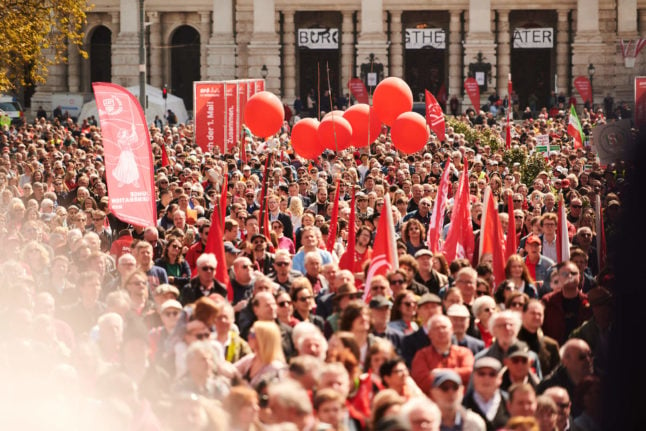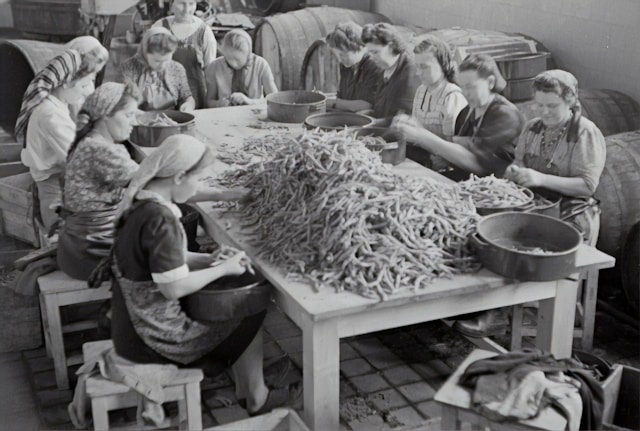As a heavily Christian country, Easter is a big celebration in Austria. It is a time when family and friends come together to enjoy the holiday and its typical traditions while celebrating the beginning of spring. Even though many stores will be closed during the holiday, various events, such as different Easter markets, are open daily.
Travelling around Austria to explore and enjoy the Easter traditions leading up to the big day, Easter Sunday on March 31st, is a good idea during this time of the year.
READ MORE: Which days off will workers in Austria get in 2024?
Austrian Easter Traditions
In Austria, the Easter holiday involves many different specific traditions, from participating in egg hunts to enjoying bonfires together with friends and family or visiting an Easter market.
When it comes to typical food during Easter, the most popular traditions include eating sweet bread rolls (Osterpinzen), ham in bread crust (Schinken im Brotteig), hard-boiled eggs painted in different colours, and cakes in the shape of a baby lamb (Osterlamm). The lamb cake symbolises Jesus Christ as the “Lamb of God” in Christian theology and represents springtime and renewal.
The painted and decorated eggs are also essential; they are given away as presents or left as decorations in the house or hidden for children to find during the egg hunt, a vital part of Easter Sunday for many families.
The biggest celebration day during Easter is Easter Sunday, this year taking place on March 31st. It is the day when families and friends arrange egg hunts for children and decorate their homes with pussy willow plants (Palmkätzchen). The plants are seen as symbols of faith and protection.
Austrian folk tradition says that if you burn your Palmkätchen on this day after letting the priest bless them, they will protect your fields from bad weather during the year.
It is also typical to visit an Eastern bonfire in Austria, especially if you are in Carinthia and Styria. It is common to have a bonfire outside, Osterfeuer, together with friends and family on Holy Saturday (Karsamstag), which is one day before Easter Sunday. Smaller cities and towns especially often organise public bonfires where everyone is welcome.
The bonfire tradition celebrates the rebirth of Jesus but is also seen as a celebration of the beginning of spring. In some regions of Austria, specific customs are associated with the Easter bonfires. For example, it is believed that jumping over the flames of the bonfire can bring good luck or chase away evil spirits.
READ MORE: 8 unmissable events taking place in Austria in March
Eastern markets
Easter markets are popular places to visit during the holiday. Almost every city and small town in Austria has their own Easter market where locals and visitors gather. The markets typically open two weeks before Easter Sunday, so this year, they will open around March 15th.
A traditional Austrian Easter market is typically filled with stalls selling food, drinks, arts and crafts, and other items, often locally produced. It is a common place for family and friends to gather and enjoy music, drinks, food, and live performances.
Vienna is very famous for its many Easter markets. The largest ones take place at Schönbrunn Palace or Am Hof Square and Freyung Square in the first district. Here you can find anything from local handicrafts to enjoyable live performances with music and acts.
READ MORE: Six unique traditions that Austrians love to love
In Graz, The Franziskanerplatz Easter Market is a great market to visit if you want to find regional meat, schnapps, and cheese specialities during the holiday. Graz also offers an Easter Handicraft Market on Hauptplatz with different handicrafts and workshops.
Salzburg’s Easter Festival kicks off every year on the Saturday before Palm Sunday with an opera premiere and ends on Easter Monday when the opera is performed a second time. It is a famous festival with many programs and events involving anything from theatre plays to concerts and workshops. It is possible to book a ticket for most events online.
In Innsbruck, the Easter market takes place in the old town and hosts 31 stalls selling crafts, drinks, and other items. On top of that, the market also offers children’s crafts workshops, live music, and traditional costume demonstrations.
The largest Easter market in Carinthia is in Klagenfurt and takes place at Neuen Platz in the city centre. The market offers regional products and entertainment with live music, craft workshops, and egg hunts.
In Vorarlberg, it is popular to visit the Easter market in Dornbirn, taking place on the 23rd of March from early morning to evening with different handicraft stalls, music, and activities.
Upper Austria offers a famous Easter market taking place at Weinberg Castle in Kefermarkt from the 16th to the 17th of March. The castle is usually almost entirely decorated with Eastern and spring themes and hosts over 80 stalls with regional handicrafts. The market also offers live music, drinks food and workshops about traditional willow weaving and lace making.
READ MORE: How to celebrate Easter like an Austrian
Travelling during Easter
Public transportation services will operate on a holiday schedule in most regions during Easter. It is important to look up and plan your trips. Check the public transport schedules for each city through their homepage, and for the Austrian train service, timetables are available on ÖBB’s homepage. Also, for bus transport services such as Flixbus, you can check their timetable in advance.
If you are travelling by plane, booking your trip on time is a common holiday period and planes might be full, leading to increased prices as the occasion approaches.
In general, traffic is expected to be heaviest all over Austria between March 30th and April 1st, as this involves the culmination of Easter with Easter Sunday and Easter Monday, which is a public holiday. During this time, the roads are expected to be busier.




 Please whitelist us to continue reading.
Please whitelist us to continue reading.
Member comments